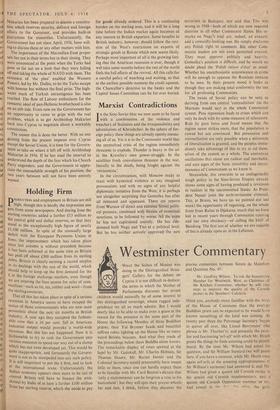Holding Firm
n aoDucnoN and employment in Britain are still I high, though this is hardly the impression one gets from some newspapers. And during June the sterling countries added a further i13 million to the central gold and dollar reserves, so that they stand at the exceptionally high figure of nearly 1.1,100 million. In spite of the unusually large deficit with the European Payments Union in June, the improvement which has taken place since last autumn is without precedent because it has been achieved at the same time as Britain has paid off about £300 million from its sterling debts. Britain is clearly earning a record surplus in its dealings with the rest of the world, which Should help to keep up the firm demand for the In the foreign exchange markets, even though we are entering the lean season for sales of com- modities—such as tin, tea, rubber and wool—from the sterling countries. That all this has taken place in spite of a serious recession in America seems to have escaped the notice of those commentators who are now most pessimistic about the next six months in British industry. A year ago they accepted the fashion- able view that a 10 per cent. fall in American industrial output would provoke a world-wide recession. But this has not happened. Now it is fashionable to try to rush the Government into various measures to spend our way out of a slump Which has not even developed yet. This would be quite inappropriate, and fortunately the Govern- ment is not to be stampeded into any such policy. It is still important to put the first, and to look at the international scene. Unfortunately the Indian economy appears once more to be out of control. Britain will have to finance the with- drawal by India of at least a further £100 million from her sterling reserve, which she needs to pay for goods already ordered. This is a continuing burden on the sterling area, and it will be a long time before the Indian market again becomes of any interest to British exporters. Some benefits to British industry, however, should follow the revi- sion of the West's restrictions on exports of strategic goods to Russia which now seems likely. Perhaps most important of all is the growing feel- ing that the American recession is over, though it will take some months before the rest of the world feels the full effects of the revival. All this calls for a careful policy of watching and waiting, so that at the earliest possible moment the credit squeeze, the Chancellor's directive to the banks and the Capital Issues Committee can be for ever buried.






















































 Previous page
Previous page